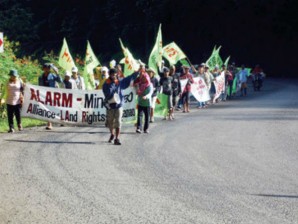Farmers’ hunger strike starts Thursday
Hundreds of farmers are poised to go on a hunger strike beginning Thursday to press President Benigno Aquino to make a firm commitment that he will complete the agrarian reform program before its expiration in two years.
The farmers marched for 10 days from their farms in Davao, Bukidnon and Negros Occidental provinces before assembling outside Malacañang on Friday to demand that 900,000 hectares of land that had evaded coverage under the Comprehensive Agrarian Reform Program (CARP) for 24 years be distributed before it ends on June 30, 2014.
Cabinet officials told the farmers that they would discuss their concerns with the President before scheduling a meeting with him, according to Malacañang.
Palace officials earlier said that Mr. Aquino was committed to completing the five-year CARP extension with reforms, or Carper, before he steps down in 2016.
“We will ask that P-Noy (Aquino) face us and tell us himself that the lands will be distributed,” said Lani Factor, deputy coordinator of Task Force Mapalad (TFM), a civil society organization at the forefront of the campaign for the full implementation of Carper within the next two years.
Article continues after this advertisement“The farmers will stop the hunger strike when there is a clear message from the President,” Factor said.
Article continues after this advertisementThe farmers, numbering from 200 to 300, were to march today from the Caritas compound in Manila, where they were staying overnight, to the Department of Agrarian Reform (DAR) office to begin their hunger strike, Factor said in a telephone interview.
The group had a medical checkup Wednesday in preparation for the hunger strike.
At least 52 members of the Catholic Bishops’ Conference of the Philippines have endorsed a letter by the farmers sent to the President on June 1 seeking a dialogue with Mr. Aquino. The President left for London on June 4 and from there directed Malacañang officials to meet with the farmers last Friday.
Underperforming
The letter slammed Agrarian Reform Secretary Virgilio de los Reyes for “consistently underperforming” in the distribution of the remaining lands comprising some of the nation’s most productive agricultural estates.
The letter said the farmers were becoming “restless and desperate,” fearing that their struggle for land reform for decades “will be all for naught.”
The President’s mother, the late democracy icon Corazon Aquino, launched the CARP in 1988 as the centerpiece of her social justice program to ease poverty and eliminate one of the causes of a simmering communist insurgency.
It was extended for another five years in 2009, but the program had been underfunded and this year, an additional P4.9-billion allocation for technical support and credits was lopped off.
Critics said Mr. Aquino had neither personally talked about agrarian reform nor included the subject in his State of the Nation Address, indicating a lack of enthusiasm for the program.
The Save Agrarian Reform Alliance (Sara), an umbrella group of various farmer organizations, said yesterday that CARP was in a state of “paralysis” under the Aquino administration.
“From our consultations with farmers’ and advocacy groups in Luzon, Visayas and Mindanao, there is only one message from the peasantry—that DAR is paralyzed even as Malacañang’s stand on the issue has remained vague. DAR’s people, especially the bureaucracy below is no longer inspired to work,” Sara spokesperson Trinidad Domingo said in a statement.
Loss of confidence
The group said many landholdings had not been distributed because of various problems, such as the refusal of agrarian reform officials to take action, the non-installation of farmers, and problems in excluding beneficiaries and identifying lands.
Vic Fabe of the peasant organization Pakisama said Malacañang’s solution of forming a task force to address farmers’ concerns showed its loss of confidence in the DAR’s capacity to implement the program.
But Sara members said the task force would be a failure if the administration continued its antifarmer policies.
The group said the administration must include the effective completion of the agrarian reform program in the President’s forthcoming State of the Nation Address.
It must also remove those who are delaying the agrarian reform program, allocate the maximum mandated budget of P150 billion, be transparent and disclose the annual list of targets for land distribution per province, Sara said.
